#jon fosse
Explore tagged Tumblr posts
Text

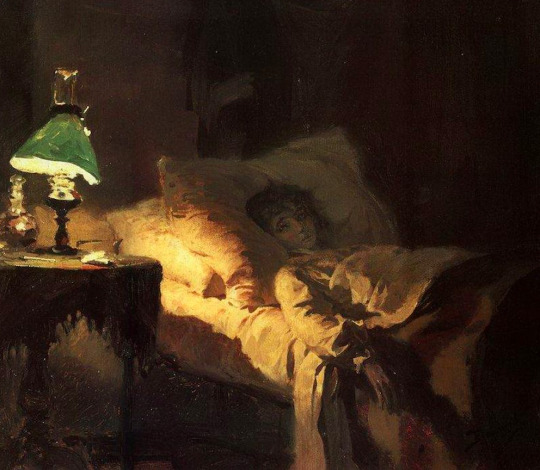
“For the heart, life is simple: it beats for as long as it can. Then it stops.”― Karl Ove Knausgård, My Struggle 1
Painting: "The Patient" by Vasily Polenov
#albert camus#classical literature#classics#quotes#franz kafka#sylvia plath#classical quotes#literature#booklr#poetry#karl ove knausgaard#my struggle#lit#classic literature#english literature#literary quotes#haruki murakami#autofiction#dark acamedia#dark academia quotes#russian literature#dostoevksy#jon fosse#edgar allen poe#emily bronte#book quote#bookblr#charles dickens#excerpts#fragments
59 notes
·
View notes
Text
(en lo repentino)
porque una vez que vemos
que no hay otros lugares a los que ir
porque una vez que vemos que no hay otros lugares a los que ir
llega el momento de marcharse
simplemente hay que marcharse, sin marcharse
en ese momento podemos marcharnos
y entonces, así ha de ser, primero
hay que ver lo que no existe
y luego hay que ir hacia los lugares que no existen
lugares que aún existen y se parecen al amor
porque lo real puede parecerse al amor
y cuando vamos hacia lo otro
los desplazamientos de lo mismo siempre están en lo otro
y se parecen, de repente a nuestro amor
que no existe
( pero en ese momento repentino existe)
_ Jon Fosse, Poesía completa. Traducción de Cristina Gómez Bagguethunn. Poesía sexto piso.
25 notes
·
View notes
Text

Morning and Evening by Jon Fosse
The Nobel prize winner pushes at the veil between this world and the next in the immersive tale of a solitary fisherman
How should one write about death – not as experienced by those who merely witness it, but by the people doing the actual dying? Many attempts have been made, but some favourites barge to the front. In The Death of Ivan Ilyich, Leo Tolstoy terrifies both us and his eponymous magistrate with the “black sack” into which Ivan is being pushed by “an invisible, invincible force”. In Tobias Wolff’s Bullet in the Brain, a book critic is shot by a bank robber, triggering “a crackling chain of ion transports and neurotransmission” that throws up a random memory of a childhood game of baseball.
Will Self, in The North London Book of the Dead, looks beyond the moment of oblivion, suggesting that when we die we move to Crouch End or Grays Thurrock. In Immortality by Milan Kundera, the “other world” is a place where Goethe, out for a stroll, can bump into Hemingway. After the two men spend a bit of time discussing the rather judicial-sounding affairs of the afterlife, Goethe remembers he is in a postmodern novel and remarks, “You know perfectly well that at this moment we are but the frivolous fantasy of a novelist who lets us say things we would probably never say on our own.”
Jon Fosse, who last year was awarded the Nobel prize in literature, has done both the Ivan Ilyich moment of death – “a ball of blue light shoots into my forehead and bursts” (I won’t say which book, and character, this line brings to an end) – and what follows. His novella Morning and Evening, which was published in Norway in 2000 and is now appearing in the UK for the first time, translated by Damion Searls, pushes and probes at the veil that hangs between this world and the next, and takes us a tantalising distance beyond it.
Its subject is Johannes, whose birth we witness in the book’s opening section. In the much longer second part we meet him again as an old man, a fisher living in near solitude in an island community. His wife, Erna, is dead, and so is his best friend and neighbour, Peter. Johannes had a difficult relationship with his father, Olai, and it seems as if Johannes’s children have had their struggles with him, too. The only person he sees regularly is Signe, the second youngest of his seven children.
The day on which most of the book takes place is both like and unlike any other. Johannes has a smoke, some bread and cheese, a cup of coffee; as is often the case in Fosse’s work, his simple, heavily repetitious prose synchs us, to hypnotic effect, into the time-worn groove of a daily ritual. But the coffee is flavourless, and the cigarette doesn’t satisfy as it should. As the day goes on, it continues to seesaw between normality and strangeness. Johannes’s familiar aches and pains seem to have disappeared, and certain objects in his home have begun to glow, “but the road down to the wharf is still the same old overgrown path it’s always been, and the rocky peaks around him are the same as ever, and the heather is the same, and at home this morning everything was just like before too, he rolled himself a cigarette as usual and made coffee and a slice of bread with some brown cheese, everything this morning was like every morning before”.
It is possible, at a stretch, to read Morning and Evening as the portrait of a failing mind. Johannes doubts his faculties when he sees his friend Peter, who is meant to be dead. Fosse wrings some humour from his unwillingness to clarify matters: “to ask someone something like that, it’s indecent, Johannes thinks”.
Fosse converted to Catholicism in 2012 and his masterpiece, Septology, the seven-novel sequence he published between 2019 and 2021, contains frequent references to the 14th-century Catholic priest and mystic Meister Eckhart. But even in books where the references are less explicit, his writing can be seen to possess a numinous aspect – “mystical realism” is a term he has used to describe it. I found Morning and Evening, which sits at the more supernatural end of his work, less powerful than books such as Melancholy I and II, Aliss at the Fire and Septology; still compelling and rewarding, but not as overpoweringly immersive in the way it moves between the present and the accreted layers of the past.
This is a spiritual book, but Johannes’s journey is one into mystery. The novella is never pious or proselytising; the word heaven does not appear. The closest Fosse comes to cliche is an occasional golden halo. When Johannes presses Peter on what it’s like where they are headed, his friend replies, “It is not good or bad, but it is big and calm and it vibrates a little, and it’s bright, if I had to put it into words, but the words don’t say very much”. Definitely not Crouch End, then, but not clouds and cherubim, either. A place beyond words, and so beyond the reach of this book.
Daily inspiration. Discover more photos at Just for Books…?
11 notes
·
View notes
Text

Books of 2024: June Wrap-Up.
Okay, y'all have Convinced Me--I'm going to start doing little wrap up posts! Behold: a shelf of what I read in June (not pictured: the bookmark at page 466 of ORDINARY MONSTERS, because despite having read two (2) books worth of book so far, I'm still not quite done with that one).
June was kind of a slow reading month for me (I did a LOT of writing, looking back--nice). I wanted to take OTHER TERRORS and THE ELEMENTS OF ELOQUENCE a bite at a time so the horrors and figures of rhetoric (respectively) didn't all run together. Both of those, much like A SHINING, turned out to be pleasantly leisurely wanders, whereas MONSTERS is kind of a plod.
I already did bigger write-ups for TERRORS and SHINING, linked in the bullets below.
OTHER TERRORS - ★★★★ Great bite-sized horror anthology with a really inclusive mix, as promised! I enjoyed most of these (always nice in an anthology!)
A SHINING - ★★★★ Weird fucked up heavy little book in translation, lit-fic flavored, but very approachable, I thought. Tiny enough to swallow in a sitting, but also kind of exhausting to do it that way? I'll definitely reread this one in the future.
THE ELEMENTS OF ELOQUENCE - ★★★ Fun romp through rhetoric! The examples were fun, and I appreciated the humor, but I also find myself still uncertain what a bunch of the figures actually ARE, definitions-wise, despite having read a book full of so many of them (I did just buy his recommended A HANDLIST OF RHETORICAL TERMS to help with that, at least, which is. almost entirely. definitions by volume). Neat thing to have on my references shelf, but it wasn't as excellent as I was hoping it'd be.
ORDINARY MONSTERS - 466/658 pages read; will report back later (but it's not looking good, folks).
#books of 2024#books of 2024: june wrap-up#other terrors#a shining#the elements of eloquence#ordinary monsters#jon fosse#mark forsyth#jm miro#is this anything??#i don't actually usually rate things on GR if they're not 4/5#(rarely 1/2)#i almost never rate 3s#so i pulled the 4 stars from my goodreads but made up ELOQUENCE after the fact#also ordinary monsters does NOT need to be this long holy fuck#anyway i finished writing a novella at the end of may#wrote a short story at the beginning of june#spent a weekend in a hotel making Liminal Space Notes for revision purposes#and then spent a week picking at that scene at the end of june#had a great time on the writing front#it does in fact mean words goes slower though#oh heck i'm also partway through alpha reading a friend's manuscript too huh#that's not on my Read In June but i read like 40 pages of that so far XD
23 notes
·
View notes
Text

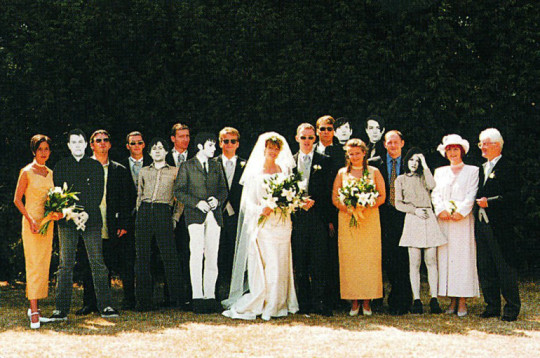
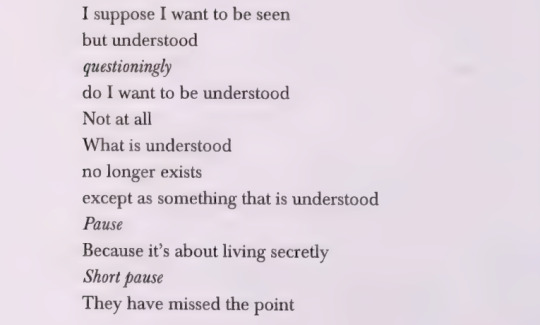

In My Secret Life - Leonard Cohen // Album cover of Pulp's Different Class // Living secretly - Jon Fosse // I Keep Mine Hidden - The Smiths
120 notes
·
View notes
Text
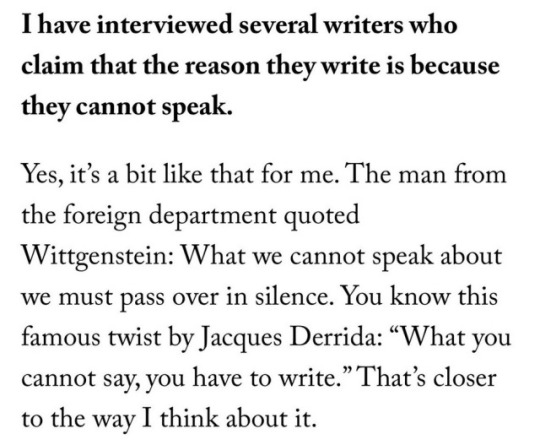
[x]
#hiyutekivigil#jon fosse#words#lit#literature#on writing#academia#academia aesthetic#dead poets society#dead poets society aesthetic#quotes#interviews#quote
30 notes
·
View notes
Text
Entrevista a Jon Fosse
Jon Fosse, bajo la lluvia (tan importante en sus libros), en la localidad noruega de Frekhaug Helge Skodvin / Getty Jon Fosse: “A los 7 años estuve a punto de morir, fue una experiencia bella” En el jardín del palacio real noruego vive un escritor. Se llama Jon Fosse (Haugesund, 1959) y, más allá del premio Nobel de Literatura (que ganó en el 2023), goza Origen: Jon Fosse: “A los 7 años estuve…

View On WordPress
2 notes
·
View notes
Text
...everyone has a deep longing inside them, we always always long for something and we believe that what we long for is this or that, this person or that person, this thing or that thing, but actually we’re longing for God, because the human being is a continuous prayer, a person is a prayer through his or her longing...
Jon Fosse, Septology
23 notes
·
View notes
Text
“…and I lie there and I think now I need to go to sleep soon and I'll pray one of the quick prayers with my rosary, my usual kind, because it's not that often that I pray in my own words, and when I do it's for intercession, I'm embarrassed when it comes to that, if I pray for something that has to do with me then it has to be to let me be good for someone else, and if it specifically has to do with me then I pray that it should be God's will that it happen, yes, Thy will be done Fiat voluntas tua On earth as it is in heaven Sicut in calo et in terra and I am so tired so tired I need to sleep but I'm probably too agitated to get to sleep…”
2 notes
·
View notes
Text
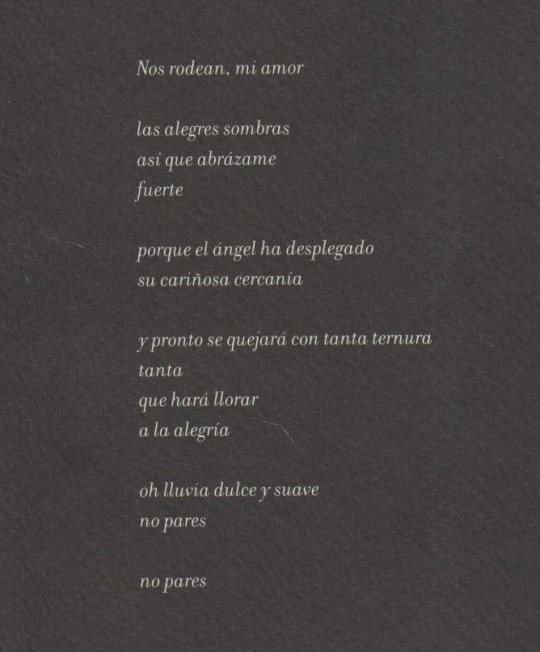
Jon Fosse · Poesía completa, Volumen II · Traducción de Cristina Gómez-Baggethum · Sexto Piso · 2024
5 notes
·
View notes
Text
mientras llega otra cosa
tú continúas la anterior
antes de estar en otra mientras la anterior
adquiere paredes como una casa
en la que alguna vez estuviste. Son casas tan claras como el agua
y tan silenciosas
como la oscuridad de la lluvia, mientras, desde lo anterior, hacia lo otro
como en movimiento, eres: así que da agua inocente
como un regalo
que ambos podamos respirar
_ Jon Fosse, Poesía completa. Traducción de Cristina Gómez Bagguethunn. Poesía sexto piso.
14 notes
·
View notes
Text

The Nobel prize in literature has been awarded to 64-year-old Norwegian author Jon Fosse “for his innovative plays and prose which give voice to the unsayable”. His works include the Septology series of novels, Aliss at the Fire, Melancholy and A Shining.
“His huge oeuvre, spanning a variety of genres, comprises about 40 plays and a wealth of novels, poetry collections, essays, children’s books and translations,” said Anders Olsson, chairman of the Nobel committee for literature. “Fosse blends a rootedness in the language and nature of his Norwegian background with artistic techniques in the wake of modernism.”
“I am overwhelmed, and somewhat frightened. I see this as an award to the literature that first and foremost aims to be literature, without other considerations,” Fosse said in a statement.
He also told the Norwegian public broadcaster NRK that he was “surprised but also not” to have won. “I’ve been part of the discussion for 10 years and have more and less tentatively prepared myself that this could happen,” he said.
Jacques Testard, Fosse’s fiction publisher, said on hearing the news: “He is an exceptional writer, who has managed to find a totally unique way of writing fiction. As his Norwegian editor Cecilie Seiness put it recently in an interview: if you open any book by Jon and read a couple of lines, it couldn’t be written by anyone else.
“His fiction is incantatory, mystical, and rooted in the landscape of the western fjords where he grew up,” Testard added. “It’s very important to remember that he writes in Nynorsk or New Norwegian, a minority language in Norway, a political act in itself. He’s also an exceptional playwright and poet. He’s an incredible mind, and it couldn’t have happened to a nicer person.”
The Norwegian writer’s English translator Damion Searls said he is thrilled Fosse’s work will now find an even wider audience. “I first brought Fosse’s fiction into English almost 20 years ago. I read Melancholy in German and immediately felt that the work was brilliant and needed to be translated. I found an American publisher and a co-translator, and started learning Norwegian”, he told the Guardian. “I have since translated around 10 books of his, depending on how you count them, including a libretto, a play and a forthcoming children’s book.”
Though the author and translator mostly communicate via email and hadn’t met in person until the 2022 International Booker prize events in London, Searls considers Fosse a friend. “He is the same kind, wise, modest, friendly, supportive person over email as you would expect from his novels, and corresponding with him has always brought me the same kind of peace and serenity his novels so magically impart.”
Born in 1959 in Haugesund on the west coast of Norway, Fosse grew up in Strandebarm. Aged seven, he nearly died in an accident, which he said was “the most important experience” of his childhood and one that “created” him as an artist. In his adolescence, he aspired to be a rock guitarist, before turning his ambitions to writing.
His debut novel, Raudt, svart (Red, Black), was published in 1983. His first play to be performed, Og aldri skal vi skiljast (And Never Shall We Part), was staged at the National Theater in Bergen in 1994. Yet, the first play he wrote, Nokon kjem til å komme (Someone Is Going to Come), would lead to his breakthrough in 1999 when French director Claude Régy staged it in Nanterre.
Fosse went on to become the most-performed Norwegian playwright after Henrik Ibsen. He has written more than 30 plays, including Namnet (The Name), Vinter (Winter) and Ein sommars dag (A Summer’s Day). His longer works include the Septology trilogy, the third volume of which was shortlisted for the international Booker prize in 2022.
Septology, which Fosse started during a pause from playwriting and after converting to Catholicism in 2013, is about an ageing painter, Asle, living alone on the south-west coast of Norway and reflecting on his life. There in Bjørgvin lives another Asle, who is also a painter but struggles with alcohol. The doppelgangers are consumed by the same existential questions about death, faith and love.
In 1989, the same year that Fosse’s novel Naustet (“Boathouse”) came out, the writer taught the fellow Norwegian author Karl Ove Knausgård, who was a student at the Academy of Writing in Hordaland. “Fosse’s voice is unmistakable in whatever he writes, and is never anything if not present,” wrote Knausgård in 2019.
Fosse’s UK publisher is Fitzcarraldo Editions, which also publishes Annie Ernaux, the winner of the 2022 Nobel prize in literature. Fosse’s win marks the London-based independent publisher’s third win in five years: Olga Tokarczuk was made laureate in 2018. The prize was postponed and awarded in 2019 instead due to a sexual assault scandal involving the husband of one of the academy’s former members which led to several members resigning.
Fosse resides between Austria and Norway. He will receive the prize at a ceremony in Stockholm on 10 December. He will receive 11m SEK (£821,209), up from 10m SEK awarded last year.
Daily inspiration. Discover more photos at Just for Books…?
37 notes
·
View notes
Text
hello fellow denizens of our beloved hellsite, please help me select my next book to read based on ZERO propaganda, only titles and cover vibes. here are The Options:
and here they are, all lined up and waiting:
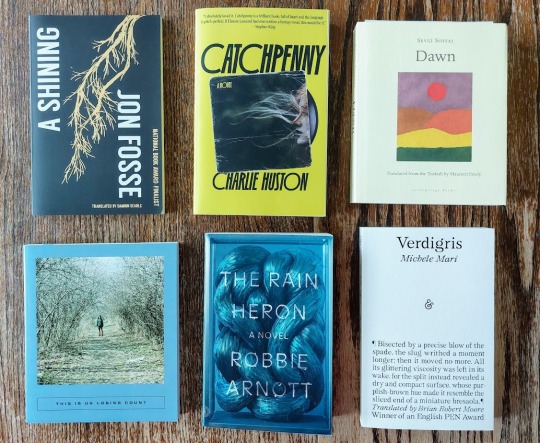
help me, button-pressing site, you're my only hope!!
#books#poll#what should i read next#a shining#jon fosse#catchpenny#charlie huston#dawn#sevgi soysal#this is us losing count#the rain heron#robbie arnott#verdigris#michele mari#no popular picks we die like Readers#i'm hoping all these are niche enough not to skew my results too horribly#(niche enough or new enough lmao)#(catchpenny just came out)#books of 2024#love that i can outsource my executive function like this honestly#i have things coming to me next week probably but i need something to hold me over until then
28 notes
·
View notes
Text

Norwegian author and dramatist Jon Fosse won the 2023 Nobel Prize in Literature!
17 notes
·
View notes
